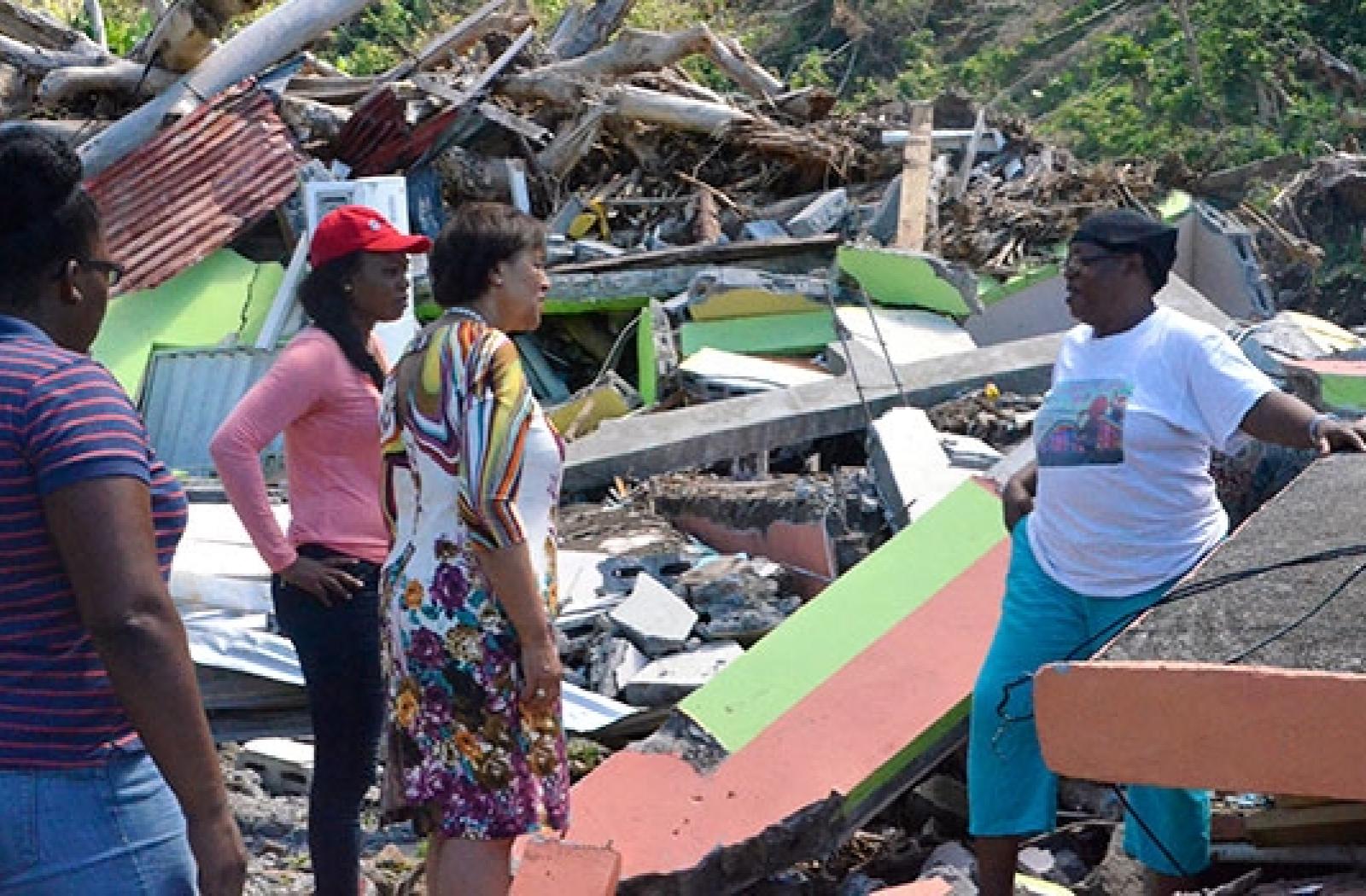By taking coordinated collective action, the nations of the Commonwealth can accelerate the mobilisation of international efforts that are the only hope if we are to prevent further detrimental human impact on the delicate natural balance of our planet.

It has been almost two years since I sat in a security plane flying over the once familiar, but then almost unrecognisable, terrain of Dominica - the country of my birth.
I was on my way from Barbuda where Hurricane Irma had caused unimaginable destruction, forcing a complete evacuation of the island. It is hard to describe the gut-wrenching effect of watching acres of utter devastation unfold before my eyes. Hurricane Maria’s ferocity had claimed lives, demolished the country’s GDP and completely changed landscapes, turning villages into wastelands, bulldozing mountainsides, and even stripping the bark from trees.
But it is not just in the Caribbean that natural disasters linked to climate change are rising in number and intensity. In widely varying locales and environments around the globe, we see the scars of droughts, freak storms, hurricanes, cyclones, floods, mudslides and rising sea levels. In 2018 alone, natural disasters claimed more than 5,000 lives and resulted in 28.9 million people needing to receive emergency assistance or humanitarian aid.
These events have brought far deeper awareness of the issues at stake, triggering street protests, generating new hashtag trends, and prompting widespread popular concern and urgent debate in parliaments. When Commonwealth Heads of Governments met in April last year, it was evident that everyone around the table recognised climate change as a serious threat.
With the Atlantic hurricane season again imminent, countries are bracing themselves for the possibility of disaster, and considering strategies to withstand or mitigate the impacts of the escalating climate crisis. Yet with heavy question marks hanging over commitment to multilateral collaboration, there are added threats to the ability of the governments that need it most to leverage in really effective ways the full benefits that international cooperation brings.
The range of perspectives and collective support that intergovernmental organisations such as the Commonwealth bring to the fight against climate change can too easily be taken for granted, and the transformational opportunities they are able to unlock - particularly for the most vulnerable and marginalised tends to be overlooked. An example of this, in which the Commonwealth has clearly demonstrated its value, is the facilitating of financing for climate action.
There are hundreds of billions of dollars, as much as USD 681 billion in 2016, earmarked for initiatives related to climate change, including for ocean preservation projects, to have fewer CO2-emitting vehicles on the road, and for boosting renewable energy options. Many Commonwealth members are eager to take advantage of these funding streams, but are finding it difficult to cut through the red tape and comply with the onerous criteria and conditions tied to the funding.
However, since we launched our Climate Finance Access Hub in 2017, a Commonwealth initiative which deploys specialists to ministries to assist with funding applications, we have helped countries in Africa, the Caribbean and the Pacific to access USD 25.3 million, with a further USD 367.4 million in the pipeline.
We have also been focused on how to help countries make the best use of development assistance. Preliminary research by the Commonwealth shows that between 2010 and 2016, small states failed to utilise $4.5 billion of development assistance made available
In fact, there are a myriad examples of unused funds being returned to donors because small and vulnerable member states were not able to draw down and use them, mainly because of lack of capacity and coordination for the implementation of developmental projects.
The issue is one of the most challenging obstacles facing our smaller and less-resourced member states, and is a powerful example of the key role multilateral organisations including the Commonwealth have in helping member countries to address climate change. Intergovernmental bodies such as the Commonwealth Secretariat are able to serve as ‘consultants of choice’ for member states, offering cost-effective access to in-house expertise.
Our experts have also created a number of DIY resources in the form of implementation toolkits. Along with our training programmes, these help countries build the skillsets they need to create strong and effective programmes that satisfy donor requirements. One such tool is our Commonwealth Disaster Risk Finance Portal which is currently under development. The portal is designed to help member states navigate the complex and growing provision of disaster finance. As well as helping governments to find what disaster finance instruments are available, the portal will assist them with identifying those that are most suited to their particular needs and circumstances.
Our Commonwealth approach has always been to cooperate in exchanging among regions and at all levels of development experience gained through practical action. To assist in this, we issue technical papers to update small states on case studies and responses that have or have not proved to be effective in strengthening disaster preparedness, response and recovery.
In 2018, we undertook a comparative analysis of the experience of Dominica and Vanuatu with disaster risk reduction and management, particularly in the cases of Cyclone Pam and Hurricane Erika. Both countries embody similar geographical, social and economic characteristics and vulnerabilities.
The main lessons from this analysis reinforced the importance of (i) strong macroeconomic foundations, (ii) mainstreaming and implementation of disaster risk reduction and management strategies and (iii) having provisional financing arrangements in place. Our experts presented these findings to 23 small states at the fifth Commonwealth Global Biennial Conference on Small States.
Deeper awareness of how our action or inaction will affect the future of our planet is now firmly embedded in Commonwealth engagement at every level. This was clear when our member governments adopted the Commonwealth Blue Charter last year, which includes commitments to rid the ocean of plastic, and to ensure its resources are used in ways that do not cause further damage to sea life.
By taking coordinated collective action, the nations of the Commonwealth can accelerate the mobilisation of international efforts that are the only hope if we are to prevent further detrimental human impact on the delicate natural balance of our planet. It is our duty to ensure that our children and our children’s children have clean air to breathe, can benefit from a healthy ocean, and are able to live sustainably and in harmony with a diverse and thriving range of animal and plant life in our ocean and on our common earth.



